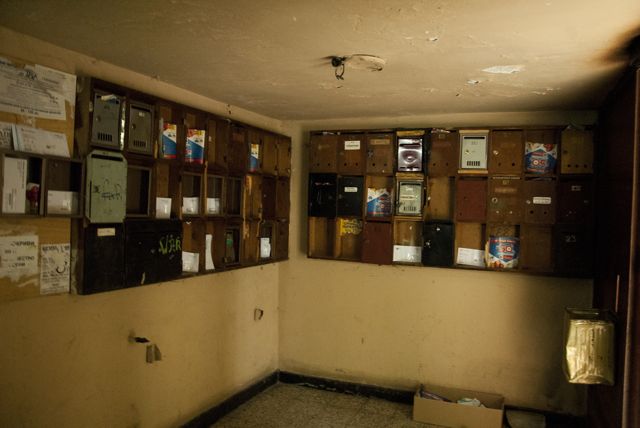Pictures - the author
In line with the large-scale initiative to satisfy housing demand, reforms were also introduced in the regulations governing housing construction, both in terms of city-planning and architecture. New requirements were introduced regarding space comfort and access to services (public, healthcare, social and transport). Schools, kindergartens, hospitals and supermarkets were to be built in all housing complexes, yet not all of them were built in fact. Many of the new residents of concrete panel complexes went through a culture shock. People who had previously used outside toilets and water heated in the sun, had all in one place conveniences such as central heating and functionally zoned rooms (for the day and night time). A negative culture shock was experienced by those citizens who were accommodated in concrete panel complexes in peripheral areas after living in the centre of towns and cities. In other words, the majority of the population considered it a privilege, and even some progress, to live in the concrete panel complexes. Here is how two words – ‘panelka’ (a derogative term for a small flat in a concrete panel block) and ‘Lada’ (the brand of car which was most common in Bulgaria in that period) became lifestyle benchmarks in urban folklore.
How do concrete panel blocks of apartments fit into the new urban environment in Bulgaria?
The contemporary urban housing environment in most cases is inferior to the environment in concrete panel housing complexes according to a number of indicators. Since neither city-planning policies, nor municipal practices encourage the free construction of homes, market incentives ‘project’ contract construction which was typical of the Middle Ages and is a huge step backwards in urban development. Therefore I see a lot of potential in the construction of concrete panel complexes because of their major resource – free space. A lot of future architects and designers will put their efforts into making the buildings and the environment in those complexes more aesthetic, therefore I believe we will see a lot of interesting projects.
What would be the right approach to private owners of flats in these blocks who equip their homes with glazing and colourful insulation without any consideration for the overall design and appearance of the building? The issue of ownership of concrete panel homes is especially important within its local context. Unlike Germany, France, and other European countries, where concrete panel blocks are public housing and therefore are property of the municipality or the state, municipal housing is an exception in Bulgaria. There are two interpretations for comparing local and global cases.
The positive interpretation of the ownership issue is that of the advantages of homes which have their owners. We see both the positive and negative effects of this in contemporary concrete panel housing complexes. The social microclimate in a concrete panel block of flats in Bulgaria is better than that in a social housing complex in Germany, which is dwelled in by persons with similar social and cultural status, basically unemployed people, immigrants, as well as people with anti-social behaviour. In our case, a highly-paid IT specialist might live next-door to a retired person who finds it hard to survive. Similar blending of different social and cultural layers of society might also lead to conflicts, yet it seems to be closer to natural processes and the opportunity for controlling each other’s behaviour. On the other hand, diverse private interests and opportunities pose significant challenges to the maintenance of buildings and common areas. When a building is owned by the municipality, it would not be a problem to have it evacuated and complexly reconstructed or renovated. In some cases and under certain market conditions, certain concrete panel constructions might even be demolished in line with the housing policy of a municipality. It is a different case though, when multiple private interests are involved. The role of the state is equally important in this scenario, and it relates primarily to providing adequate regulation, encouraging the maintenance of the building through energy efficiency measures, but also to designing models for degradative scenarios, including emergency reinforcement or the resettlement of all residents when they cannot deal with related problems on their own. To put it in another way, the excessive responsibility assumed by government and municipality institutions results in the conversion of social housing complexes into ghettoes, and prevents the development of natural social and evolutionary processes within them.

What is the ‘life expectancy’ of a concrete panel block of flats and how can it be prolonged?